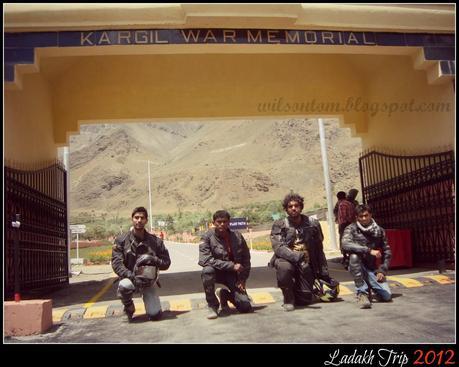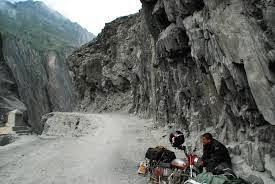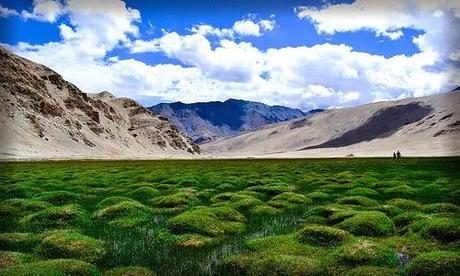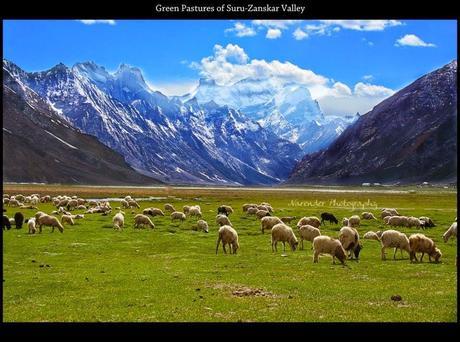 Many perennial streams and snow- fed rivers which add
more beauty to this land are found. The Drass River rises from the Machoi
glacier and is fed by many small streams and rivers on the way. This river
plays a significant role for supporting the livelihood of the people here.
Shigar flowing from the north drains an adjoining part of the Dras valley. In
summer the volume of the river rises considerably as the snow up valley melts.
The Shigar River meets the Suru River a short distance away from Kargil at
Kharul.
At the center of the Drass valley a small town by the same
name is located. This town is 60 km west of Kargil on the road to Srinagar. The
town is relatively flat and open. In summer the town puts up a pleasant look of
willow groves along the river. However, in winter the lands are covered by
thick carpet of snow.
The summer at Drass in relatively short which starts from
late May and ends in early September. Rest of the year is characterized by
acute cold.
Many perennial streams and snow- fed rivers which add
more beauty to this land are found. The Drass River rises from the Machoi
glacier and is fed by many small streams and rivers on the way. This river
plays a significant role for supporting the livelihood of the people here.
Shigar flowing from the north drains an adjoining part of the Dras valley. In
summer the volume of the river rises considerably as the snow up valley melts.
The Shigar River meets the Suru River a short distance away from Kargil at
Kharul.
At the center of the Drass valley a small town by the same
name is located. This town is 60 km west of Kargil on the road to Srinagar. The
town is relatively flat and open. In summer the town puts up a pleasant look of
willow groves along the river. However, in winter the lands are covered by
thick carpet of snow.
The summer at Drass in relatively short which starts from
late May and ends in early September. Rest of the year is characterized by
acute cold.Drass is a land of natural beauty with green willow grooves and majestic snow capped peaks. From such a high altitude the world seems to be a different place. Some of the noteworthy attractive destination of the Drass Valley are-

ZOJILA PASS: Zojila Pass is the beginning point of the Drass Valley. The Drass River originating from the Machoi galacier is near the Zojila Pass. The trek to holy shrine of Amarnath that starts from Minamarg is below the Zojila. Due to ferocious snow storms that occurs unexpectedly this pass is a little risky to cross.
This comes to nearly impossible to cross this pass without the help of the original inhabitants of this place. As the inhabitants of this valley have trained themselves well to overcome the difficulties and converse easily through this pass the inhibitants are often referred as ‘The Guardian of Ladakh’s Gateway’.
DRASS WAR MEMORIAL: This war memorial is often referred as the Kargil War Memorial. The Kargil war, 1999 ended after the Indian Army re-captured Drass town and the Kargil district.

PUGA VALLEY: The valley is well known to tourists for the hot water spring in the valley. The spring is believed to have medicinal importance and can be very helpful for people suffering from different skin disorders, and rheumatism.
MUSHKO VALLEY: The Mushko valley has gained fame by the varieties of wild flower that blossom in the deserted regions of Ladakh during summer. These flowers are unique to this valley.

SURU VALLEY: In the Kartse Kher, an ancient village in the Suru Valley, remains of Buddhism can be found. The place is famous for the 7 m tall rock carved statue of Maitriya Buddha.
TREKKING: Drass serves as one of the best base for a 3 days long trek to Suru Valley. On the way trekkers can enjoy the beautiful upland villages with green meadows on both side of the Umbala pass that lies at an altitude of 4500 m.
Many other shorter treks can be enjoyed by independent beauty lovers in the Drass Valley.
HOW TO REACH: Even though Drass Valley is characterized by snow capped peaks and rough terrain the adventure seekers can easily reach there by buses. Buses plying to Srinagar from Kargil witness the beauty of Drass on its way. Local buses leave Kargil at morning and by noon they can reach Drass.
WHERE TO STAY: As Drass is a tourist spot there are many private lodges in the valley. Many government run Tourist complexes are also available. Tourists can reserve rooms for the Tourist Complex at the Tourist Office at Kargil or other branches of the office at Drass.
NEAR BY CITIES: Kargil, 60 km west of Drass. Srinagar, the capital city of Jammu and Kashmir is about 124 km away from the Drass Valley.
